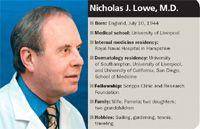- General Dermatology
- Eczema
- Chronic Hand Eczema
- Alopecia
- Aesthetics
- Vitiligo
- COVID-19
- Actinic Keratosis
- Precision Medicine and Biologics
- Rare Disease
- Wound Care
- Rosacea
- Psoriasis
- Psoriatic Arthritis
- Atopic Dermatitis
- Melasma
- NP and PA
- Skin Cancer
- Hidradenitis Suppurativa
- Drug Watch
- Pigmentary Disorders
- Acne
- Pediatric Dermatology
- Practice Management
- Prurigo Nodularis
Article
Destined for dermatology
The Royal Navy asked him what specialty he wanted to study. He chose dermatology.

One of those dermatologists is Nicholas J. Lowe, M.D. He's not your typical British dermatologist. He runs an American-style practice in central London and additionally has a private practice and a clinical research company in Los Angeles.
Dr. Lowe, 61, could have remained permanently in California at his dermatology clinic in Santa Monica, where his research included the first study of a biologic for psoriasis and pioneering work with botulinum toxin.
"Dermatology services are in demand in the United Kingdom, especially with the increasing interest in cosmetic dermatology," he says. "We should realistically have about 3,000 dermatologists."

The income that dermatologists earn from the NHS is significantly less than that earned by those in similar situations in the United States. This, plus bureaucratic frustrations, has led some specialists to enter private-sector medicine to provide an alternative to the NHS for those who can afford it.
"Being a private dermatologist in London allows me to deliver the quality of care that I choose to do," adds Dr. Lowe, who resigned from the NHS last year.
London is the center of the cosmetic dermatology boom in the United Kingdom. Dr. Lowe provides a mixture of general, surgical and cosmetic dermatology. He currently spends about half his time performing cosmetic procedures, and the remaining time doing general medical dermatology and research.
"I'm a great believer that you don't do cosmetic dermatology at the expense of general or surgical dermatology," he says. "It's a sad and unnecessary trend. I see no reason not to be proficient in several aspects of dermatology for the sake of our patients and our specialty."
Discovering dermatology
Dr. Lowe willingly opened a second practice in the country where he first discovered he wanted to be a dermatologist. Growing up outside the city of Manchester, Dr. Lowe was born to a salesman and a nurse. His mother inspired him to enter medicine.
"She certainly wanted to be a physician, but back then it was very difficult for women to get into medical school," he comments. "So she channeled her interest through me into medicine."
He entered the University of Liverpool Medical School, and decided to join a program within the Royal Navy that paid for the last three years of medical school in return for five years of service.
One of his first positions was at a Naval dockyard in southern England, where he was introduced to a number of skin diseases, including contact dermatitis, chromium ulcers and skin cancers.
"Skin disease was one of the biggest medical problems we dealt with at the dockyards, so it rather piqued my interest in dermatology," he says.






